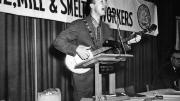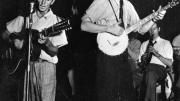On the day of his subject's ninetieth birthday, May 3, Alec Wilkinson's The Protest Singer: An Intimate Portrait of Pete Seeger (of the College class of 1940) will be published (Knopf, $22). The book ends with Seeger's unbending testimony before the House Un-American Activities Committee, on August 18, 1955. It begins, briskly, as follows.
It was the ambition of the singer and songwriter Pete Seeger as a child, in the 1920s, to be an Indian, a farmer, a forest ranger, or possibly an artist, because he liked to draw. He went to Harvard [1936-1938], joined the tenor banjo society, and studied sociology in the hope of becoming a journalist, but at the end of his second year he left before taking his exams and rode a bicycle west, across New York State. If he encountered a group of people making music on a porch or around a fire, he added himself to it and asked them to teach him the songs. He was tall and thin and earnest and polite. To eat, he made watercolor sketches of a farm from the fields, then knocked on the farmhouse door and asked to trade the drawing for a meal.
In the early 1940s, Seeger belonged to a group called the Almanac Singers, which included Woody Guthrie. The name derived from there being in most working-class homes two books, a Bible and an almanac, one for this world and one for the next. The Almanac Singers appeared mainly at strikes and at rallies supporting the rights of laborers. Seeger says that the band was "famous to readers of the Daily Worker," the newspaper of the Communist Party. The Almanac Singers broke up in 1942, after Seeger was drafted. Following the war, Seeger performed on his own for a while, then became a member of the Weavers, whose version of "Goodnight, Irene," by Huddie Ledbetter, called Leadbelly, was, for thirteen weeks in 1950, the best-selling record in America. The Weavers quit playing in 1952, after an informant told the House Un-American Activities Committee that three of the four Weavers, including Seeger, were Communists. (Seeger knew students at Harvard who were Communists, and, with the idea in mind of a more equitable world, he became one for several years, too.) Following the informant's testimony, the Weavers found fewer and fewer places to work. Seeger and his wife, Toshi, decided that Seeger should sing for any audience that would have him. They printed a brochure and sent it to summer camps, colleges, schools, churches, and any other organizations that they thought might be sympathetic. Seeger began engaging in what he calls "guerilla cultural tactics."...[H]e grew accustomed to pickets with signs saying "Moscow's Canary" and "Khrushchev's Songbird." In How Can I Keep from Singing, a biography of Seeger, David Dunaway writes that a poll conducted during the period by Harvard said that 52 percent of the American people thought that Communists should be put in jail.











